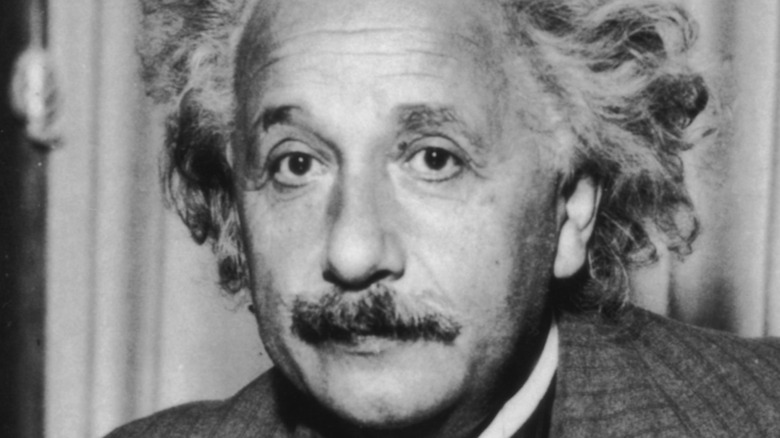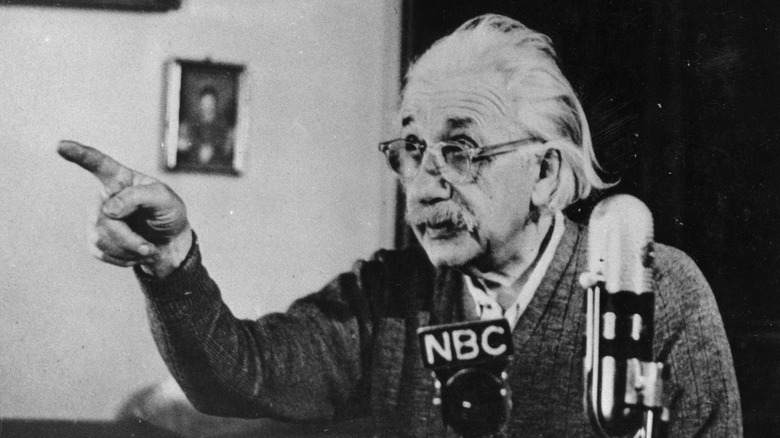The Story Behind Albert Einstein's 1946 Visit To Lincoln University
Albert Einstein is right up there with the likes of Marie Curie and Isaac Newton as one of the greatest minds in history. Like other remarkable scientists, he shaped our understanding of our world and beyond, challenging established views and forging forward with his own.
As Biography writes, Einstein developed the seeds of some of his most famous work, including his thoughts on relativity, during the early 1900s. At this time, he was a clerk at a patent office in Switzerland. This was an occupation that apparently left his brilliant brain ample time to wander to more casual topics, like some of the greatest physics conundrums ever.
In 1940, per Britannica, he became a citizen of the United States, yet the decade was a fraught one for him as it was for the rest of the world. Britannica states that he became a founding member of the Emergency Committee Of Atomic Scientists in response to the use of atomic bombs, and fought against the creation of hydrogen bombs after World War II. He was reportedly a pacifist, a humanitarian activist, and a historic 1946 journey to Lincoln University in Pennsylvania is a testament to these ideals.
Albert Einstein's visit was born of a social need
As Canadian Friends of the Hebrew University of Jerusalem (CHFU) states, Albert Einstein's trip marked a determined stand against the racism that was tragically rife in the era. By this time, he was no less than a global megastar (scientist-wise), with a great many demands on his time. There was perhaps no more prestigious scientist in the world at the time, and an association with him would naturally be an enormous boon.
As such, CHFU goes on, educational establishments far and wide wanted a piece of the electric-haired genius. He wasn't in it for the accolades, though. His cause was humanity's, and he had the respect and the platform to make sure his cause was heard. This was the reason for his trip to Pennsylvania in May of 1946. Lincoln University was reportedly the first that afforded black students the ability to earn degrees, and Einstein was there to tell them how much that mattered, and how more work needed to be done.
"There is a separation of colored people from white people in the United States. That separation is not a disease of colored people. It's a disease of white people," he said, per CFHU. He offered students advice, took the time to listen to them, and crucially, could empathize with them.
The haunted humanitarian genius
Albert Einstein had personally experienced some of the most heinous prejudice and racism, having fled Germany late in 1932 facing Nazi persecution, as Britannica writes. The Jewish mastermind's notion of relativity was reportedly bad-mouthed far and wide as "Jewish physics," and the danger he was in was so great that there was a bounty on him. He would never go back to Germany, but he would certainly continue to carry the weight of these experiences for the rest of his life. Peace-loving as he was, Britannica goes on, he believed there came a time when defending yourself against a threat as dangerous as Nazism was necessary.
However, The Philadelphia Bulletin reported in May of 1955 that Einstein spoke of his great regret for his part in the development of the atomic bomb. He told the California Institute of Technology's Dr. Linus Pauling that he, Einstein, made a "great mistake when I signed the letter to President Roosevelt recommending that atom bombs be made." Pauling claimed that Einstein had said that there was "justification for his decision in the danger that the Germans would make the bomb first."
Einstein's experiences made his stance on racial prejudice and inequality clear. Even after leaving Germany, per CFHU, he lived in New Jersey, where he continued to see such devastating division. Though his stop at Lincoln University received little publicity, it was characteristic of a man who had seen, and continued to see, terrible division, at a time when unity was needed the most.


